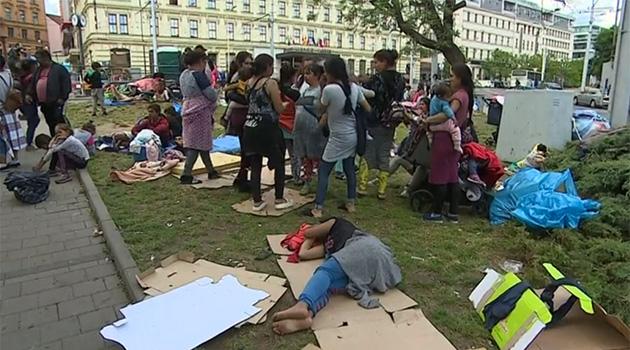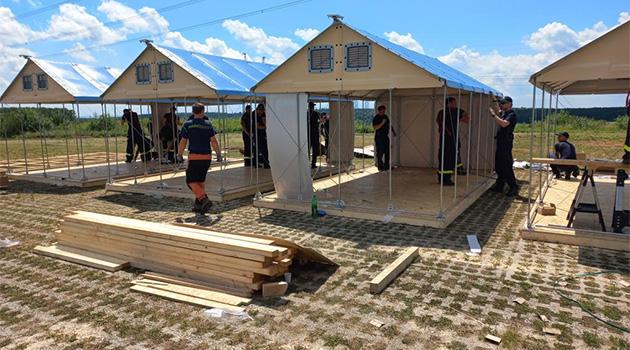Czech Republic's second-largest city to move Romani refugees living in and around the railway station to nearby plot of land

The Brno City Hall will try to move the Romani refugees from Ukraine who have been sleeping at the main railway station in recent weeks to an open plot of land between Benešova Street and Koliště Street. The building of facilities for them including tents and toilets will happen there.
Dozens of Romani refugees from Ukraine have been camping on a grassy island in front of the railway station in Brno. “The city has no leverage to make these people stop coming here, we cannot influence the fact that they are getting benefits because they are simply entitled to them,” Mayor Markéta Vaňková (Civic Democratic Party – ODS) said yesterday.
The mayor stressed that the group of refugees living in and around the railway station is not stable, but involves different people who arrive, stay a few days and then leave. “I perceive that the situation at the station is not good and it is a significantly uncomfortable situation for the citizens of Brno,” she claimed.
According to the mayor, the city has decided to offer these Romani refugees from Ukraine another place to be that is near Křenová Street, where the Labor Office that disperses social benefits is located, and near Brno’s main railway station. An open plot of land exists between the former bus station near the Grand Hotel and the municipal building at the corner of Koliště and Malinovské náměstí.
While construction preparations have long been underway there, the land remains unused. The Romani refugees were to begin relocating there yesterday if they agreed and would be offered access to drinking water and a place that is safer to stay there, including toilets.
Everything will be done on a voluntary basis. Vaňková has admitted that if they manage to relocate the Romani refugees, the city will then probably fence off the current place where they have been living in front of the railway station so that they do not return there.
Police: Romani refugees and their children are not committing crime
According to the Deputy Director of the Municipal Directorate of the Police of the Czech Republic, Milan Janík, the Romani refugees in front of the railway station pose no risk to security and the cases of disruption of public order that have been reported from there have been minor. “We have not recorded that they are committing crime here, not a single case has been reported,” said Janík.
Under the patronage of the Regional Authority of South Moravia, accommodation in a camp has been established over the last few days near the village of Ostrovačice where refugees from Ukraine can stay for several days while they wait for their protection status to be decided. According to the city and to the Regional Authority, however, the needs of the Romani refugees who will be offered places to stay in the camp are different from the Romani refugees who have been living at the railway station and who are allegedly not interested in accommodation that would be more stable as they are just briefly visiting Brno.
“They are used to living a nomadic way of life,” alleges Jan Polák, head of Brno’s Municipal Department of Social Care. According to him, the Romani refugees who are living in front of the station “prefer being out somewhere on the lawn”.
About 95 % of those Romani refugees reportedly just speak Hungarian. However, if they are citizens of both Hungary and Ukraine, the Czech Republic has declared them ineligible to receive the CZK 5 000 [EUR 200] refugee support benefit.
From next month, even those refugees who do have just Ukrainian citizenship are likely to lose their extraordinary benefits if they cannot prove they have decided to reside in the Czech Republic. The change has been approved by the Chamber of Deputies.
According to Mayor Vaňková, the situation could calm down once the terms of receiving the benefit are made clear. The refugee camp near Ostrovačice is already finished and ready to receive the first refugees, Alena Knotková, Regional Authority spokesperson, said yesterday.
